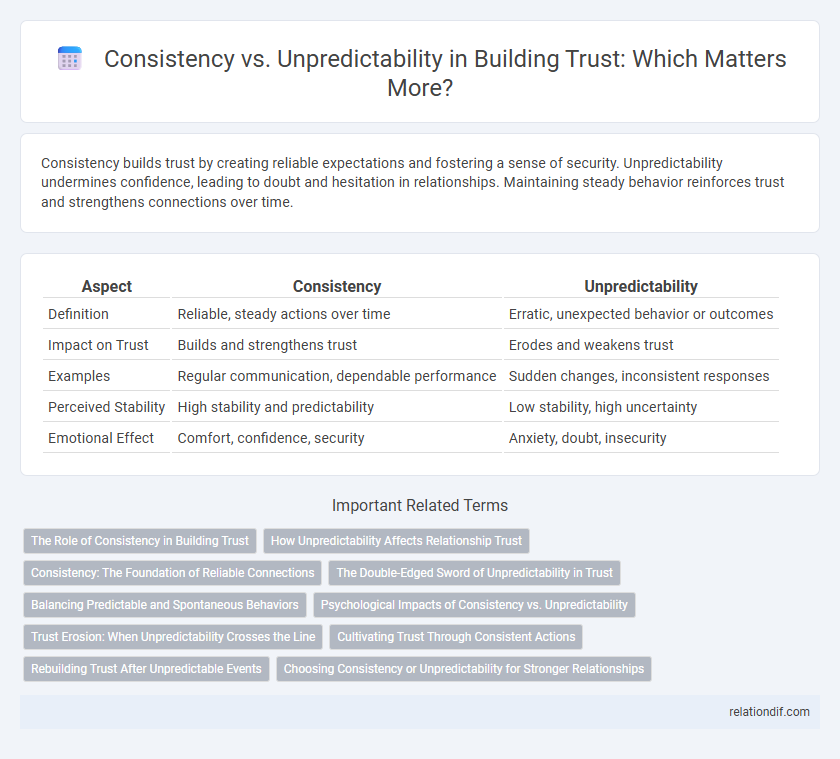Consistency builds trust by creating reliable expectations and fostering a sense of security. Unpredictability undermines confidence, leading to doubt and hesitation in relationships. Maintaining steady behavior reinforces trust and strengthens connections over time.
Table of Comparison
| Aspect | Consistency | Unpredictability |
|---|---|---|
| Definition | Reliable, steady actions over time | Erratic, unexpected behavior or outcomes |
| Impact on Trust | Builds and strengthens trust | Erodes and weakens trust |
| Examples | Regular communication, dependable performance | Sudden changes, inconsistent responses |
| Perceived Stability | High stability and predictability | Low stability, high uncertainty |
| Emotional Effect | Comfort, confidence, security | Anxiety, doubt, insecurity |
The Role of Consistency in Building Trust
Consistency in actions and communication reinforces reliability, which is fundamental for building trust in personal and professional relationships. Predictable behavior reduces uncertainty and fosters a sense of security, enabling deeper connections and long-term commitments. Repeated consistent experiences signal commitment and integrity, essential components in establishing and maintaining trust.
How Unpredictability Affects Relationship Trust
Unpredictability in behavior or communication undermines relationship trust by creating uncertainty and anxiety, which hinder emotional security. When partners cannot anticipate each other's actions, it disrupts the stability essential for building confidence and mutual understanding. Consistent patterns promote reliability, whereas unpredictability fosters doubt, making trust difficult to establish and maintain.
Consistency: The Foundation of Reliable Connections
Consistency builds trust by ensuring behaviors and actions are predictable and dependable, fostering a sense of security in relationships. Reliable communication and follow-through on commitments reinforce a stable environment where expectations are met consistently. Organizations and individuals who prioritize consistency create strong foundations for long-term connections and credibility.
The Double-Edged Sword of Unpredictability in Trust
Unpredictability in trust creates a complex dynamic where it can foster excitement and stimulate adaptive responses but also generates anxiety and skepticism. Consistent behavior reinforces reliability and safety, serving as the foundation for long-term trust development. However, occasional unpredictability can challenge complacency and promote deeper engagement, making it a double-edged sword in trust relationships.
Balancing Predictable and Spontaneous Behaviors
Balancing predictable actions with spontaneous behaviors fosters trust by providing stability while maintaining authenticity in relationships. Consistency in routines and responses creates a reliable foundation, whereas occasional unpredictability introduces freshness that prevents monotony. Effective trust-building requires integrating steady patterns with thoughtful surprises to sustain engagement and confidence.
Psychological Impacts of Consistency vs. Unpredictability
Consistency fosters psychological safety by reducing anxiety and building reliable expectations, which enhances trust and emotional stability. Unpredictability triggers stress responses and undermines confidence, leading to diminished trust and increased cognitive load. The brain's preference for predictable patterns reinforces the importance of consistency in maintaining secure interpersonal relationships and mental well-being.
Trust Erosion: When Unpredictability Crosses the Line
Trust erosion occurs when unpredictability exceeds acceptable boundaries, causing uncertainty in relationships and decision-making processes. Consistent behavior establishes reliable expectations, fostering confidence, whereas frequent deviations or erratic actions trigger doubts and weaken trust bonds. Organizations and individuals must maintain predictable patterns to prevent the gradual breakdown of trust essential for collaboration and loyalty.
Cultivating Trust Through Consistent Actions
Consistent actions build trust by demonstrating reliability and predictability in behavior over time. When individuals or organizations maintain steady communication, follow through on commitments, and uphold standards, they create a dependable environment that fosters confidence. In contrast, unpredictability undermines trust, as it generates uncertainty and doubt about future actions and intentions.
Rebuilding Trust After Unpredictable Events
Rebuilding trust after unpredictable events requires demonstrating consistent behavior through transparent communication and reliable actions. Establishing clear expectations and delivering on promises over time helps repair damaged relationships by creating a strong foundation of dependability. Emphasizing accountability and showing empathy encourages renewed confidence and long-term trust restoration.
Choosing Consistency or Unpredictability for Stronger Relationships
Choosing consistency fosters trust by providing predictability, reliability, and emotional security in relationships, reinforcing a dependable bond. Unpredictability can introduce excitement but risks creating doubt and instability, weakening emotional connections over time. Prioritizing consistent behavior enhances trustworthiness and strengthens long-term relationship resilience.
Consistency vs unpredictability Infographic

 relationdif.com
relationdif.com